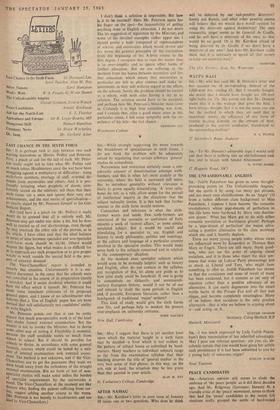LETTERS
Last Chance in the Sixth Form • Sir Desmond Lee.
fenni Daiches. Alan M. Hay
After Nassau Lord Hampton Watt's Watt B. A. People. G. Wynn Hamel
The Unfashionable Angries
Alistair Graham, Evelyn Waugh Peace Candidates Arnold Beichman Aid for the North-East E. J. Fletcher Agriculture and Europe Sir H. Legge-Bourke, MP Dangerous Skill famish Hamilton Company News Sir Bruce Wycherley 1)1'. Jung Dr. Gerhard Adler
LAST CHANCE IN THE SIXTH FORM
SIR,—II is perhaps rash to step between two such warring mastodons as Messrs. Pedley and Peterson. First, a pinch of salt for the tail of each. Mr. Peter- son really ought not to take what Mr. Pedley said SO much amiss. Headmasters since the war have been Struggling against a multiplicity of difficulties: rising sixth-form numbers, shortage of staff. external de- mands from universities and others. And it is pro- foundly irritating when prophets of doom, com- fortably seated on the sidelines, tell them that their sixth forms are a mess and ignore their very real achievements, and the real merits of specialisation— so clearly stated by Mr. Peterson himself in his Gul- benkian Report. Rut (and here is a pinch for Mr. Pedley) it really won't do to pretend that all is entirely well. Mr. Peterson may get under our skins a bit, but he does Well to remind us of our shortcomings, even though he may overlook the other side of the picture, as in his article. I have often said that the ideal balance In terms of time between specialist and non-specialist sixth-form work should be 60/40. Others would dispute the figure, but what makes it so difficult for us to approach any such proportion or to give proper weieht to work outside the special field is the pres- sure of external demand.
The Vice-Chancellors' report is intended to remedy this situation. Unfortunately it is a uni- lateral document, in the sense that the schools were not consulted in the course of its preparation (surely a mistake). And it seems doubtful whether it could have the effect which it intends. Mr. Peterson has made some trenchant criticisms of its proposed general paper, and I know of no schoolmaster who believes that a Use of English' paper has yet been devised that will satisfactorily test candidates' ability to write English. Mr. Peterson points out that it can be justly argued that much non-specialist work is of the kind that eludes formal external examination. But the answer is not to invoke the Minister, but to devise some other way of testing it. Flexibility is essential, because the staff available varies so much from School to school. But it should be possible for schools to devise, in accordance with some general formula, courses which could be tested by a mix- ture of internal examination with external assess- ....Inent- The method is not unknown,. and if the Vice- Chancellors are to get the guarantee they want we Must break away from the orthodoxy of the straight external examination. But no form of test of non- specialist studies will make sense unless the burden of specialist requirements by the universities is eased. The Vice-Chancellors at the moment are like doctors who, finding the patient suffering from sur- feit, suggest adding another course to the menu. (M. r. Peterson is too beastly to headmasters and too kind to Vice-Chancellors.) I don't think a solution is impossible. But how is it to be reached? Here Mr. Peterson again has his finger on the spot—the impossibility of getting anything done in English education. I do not much like his suggestion of legislation by the Minister; and some of his detailed examples rather appal me. I should prefer a body composed of representatives of schools and universities which would review and lay down the general principles of the curriculum from the beginning of the A-level course to the first degree. I recognise that to state the matter thus is to over-simplify and to ignore other forms of further education. But we are suffering at the moment from the hiatus between secondary and fur- ther education, which means that universities in particular are left to plan courses and make re- quirements as they will without regard to the effects on the schools. Surely the problem should be treated as a whole, with both .sides having a say in its solution. The solution would have to be accepted, and perhaps here Mr. Peterson's Minister must come in. Certainly it is high time something was done. and I confess that, after a good many years in this particular arena, I felt some sympathy with the im- patience of his title—the last chance.


































 Previous page
Previous page